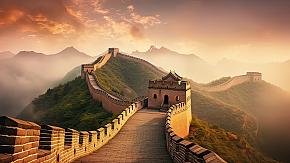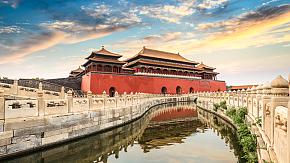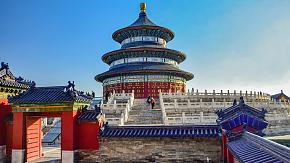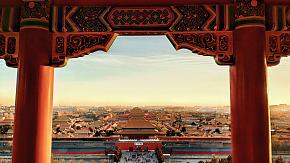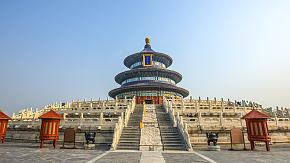7 Tips for Accessible Travel in China
China has made great strides in accessibility in recent years, making it easier for travelers with disabilities. Still, if you’re visiting China for the first time with mobility challenges, it’s natural to have some questions and concerns. So we've put together 7 practical tips to help you planning a smooth, enjoyable China journey.
1. Ask for a Doctor's Permission
Before starting a trip, please discuss with a doctor about your intention of traveling to China. You are suggested to receive an overall physical inspection to ensure that your body condition is fit for a long-distance journey.
Once given permission, ask the doctor for some medicines you need and make sure that these medicines are allowed in China. Please keep a doctor’s letter and a copy of the prescription containing your name and address to prove your ownership of these medicines when you go through customs.
2. Choose a Time that is Easier for Wheelchair Users
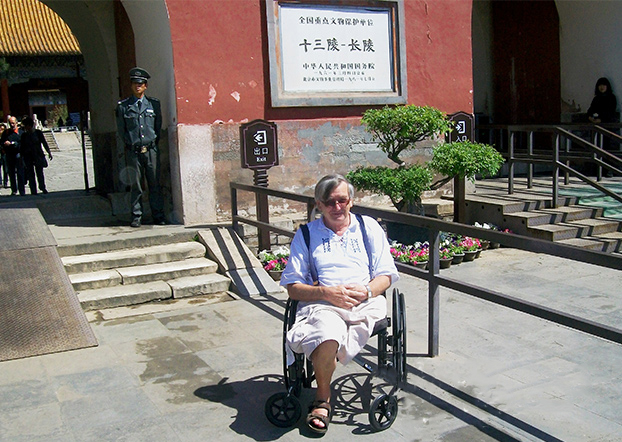 Our customer in front of Ming Dynasty Tombs, Beijing
Our customer in front of Ming Dynasty Tombs, Beijing
For a wheelchair user, traveling needs more space and better weather. So you’d better choose a suitable time which will make your trip easier. The following periods are considered the best for physically challenged visitors to China.
(1) October: October is commonly thought of as the optimal month to visit China. The weather is cool throughout the whole nation with limited humidity. Remember to avoid the first week of October (the National Day Holiday from 1 Oct to 7 Oct), since the attractions and streets will be crowded with domestic visitors, which will cause inconvenience for wheelchair users. The price of accommodation and transportation is also higher than average.
(2) September: September is another great time to visit. The north of China is cool and breezy. While the southern part still has lingering heat but is much less sweltering compared to July and August. The traditional Mid-Autumn Festival (on 15 August in the Chinese Lunar Calendar) usually takes place during this month. Chinese people have a 3-day holiday during this time and will hold a series of celebrations. It will definitely be bustled everywhere, but also a good opportunity if you are keen to experience the Chinese festival culture.
(3) April~ May: This period of time is the late spring in China with blooming flowers and a moderate temperature. The north is relatively dry while the south is in the “Plum Rain” season. This continuous rainy season forms dreamlike misty views on Li River and Yellow Mountains. Plus, this period is the low reason for tourism, so visitors can enjoy the quietness and lower price.
3. Find a Trustworthy Tour Operator to Customize Your Trip
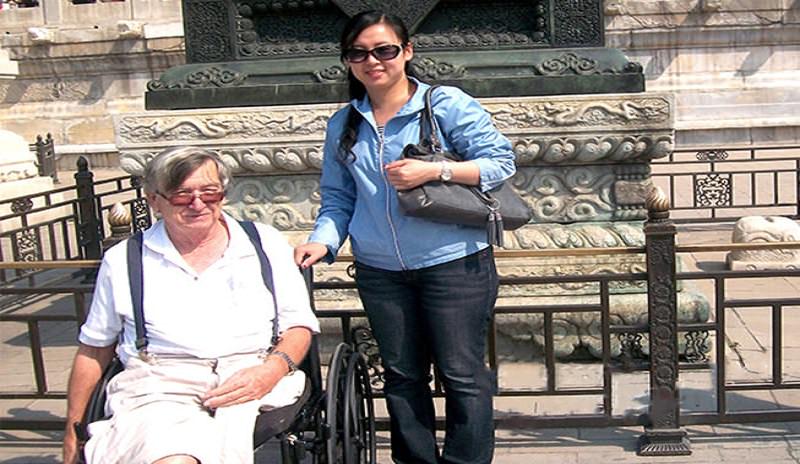 Our customer and his private guide at The Palace Museum
Our customer and his private guide at The Palace Museum
Considering your limited mobility, it is better to choose a tailor-made tour instead of a group tour. In a tailor-made tour, you can have the right to choose the routes which are most suitable for your body condition, and have a private vehicle with commodious space to transfer you from one place to another. In the meantime, a travel consultant will help you to plan your trip and take care of it from start to finish.
4. Understand the Airline Regulations on Wheelchairs
This could be the most requested tip because most wheelchair travelers consider the delivery of wheelchairs the trickiest issue in traveling. While the air traffic regulations on wheelchairs are actually very human-oriented. To help you better understand the regulations, some tips are offered below:
(1) The use of wheelchairs
Every international airport in China or abroad prepares wheelchairs for passengers to board and disembark. You can apply for one within 24 hours prior to the departure. As a wheelchair user, you have the priority to the board in advance. When boarding, you will be transferred from your wheelchair to another one, and then some well-trained staff will help you lift to your seat. The aircraft is equipped with passenger cabin wheelchairs, aisle handrails, and an accessible toilet for disabled passengers.
After landing, you will be helped to disembark and then transferred to your own wheelchair. In case of loss or damage to the wheelchair, please immediately report it to the “Lost or Damaged Luggage Desk” to claim for repair costs and compensation.
(2) Check-in of wheelchairs
All the international airlines in China or abroad accept checking in a customer’s wheelchair as oversize luggage. But the requirements of check-in differ according to the type of your wheelchair.
① Check-in of manual wheelchairs
A folding wheelchair can be stowed in the passenger cabin as long as the dimension and weight meet the requirement. Other types of manual wheelchairs can be checked in at the departure gate. Please offer as much information as possible to the airport crew if your wheelchair needs disassembly.
② Check-in of battery-powered wheelchairs
The battery-powered wheelchairs can be checked in at the departure gate. The batteries are divided into 2 categories and the check-in standards are different.
● Leak-proof battery: The battery could be securely attached to the wheelchair if short-circuiting will not occur. If the battery is detachable, it should be removed from the wheelchair and packaged in a rigid box.
● Non-leak-proof battery: The battery must be removed from the wheelchair and well packaged in a rigid, leak-proof box to prevent short-circuiting. The box should be stuffed with absorbing materials and stowed upright in the cargo bay.
5. Bring a Voltage Converter and a Plug Adaptor
In China, the standard voltage is 220V and the standard frequency is 50HZ. So if you take a battery-powered wheelchair to China, a voltage converter is essential, and a plug adaptor may be necessary as well. In addition, be aware that if you need a specially assigned person to assist with the wheelchair, there may be an extra service charge.
6. Have a Contingency Plan
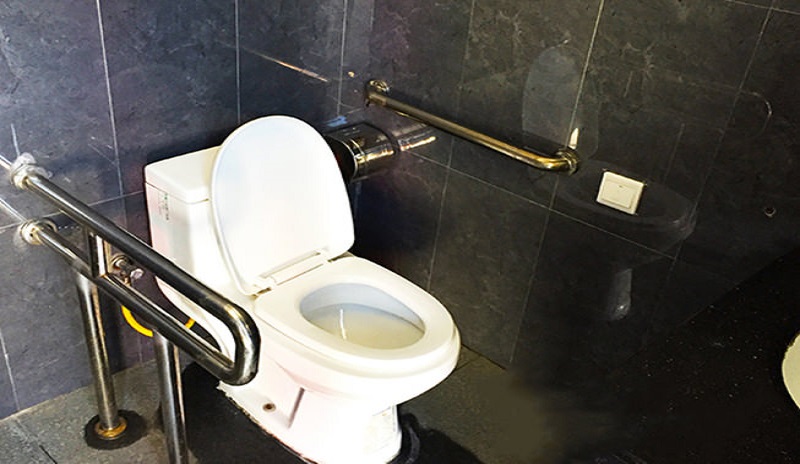 A barrier-free toilet in Guilin
A barrier-free toilet in Guilin
Even though most of the major attractions in China have installed accessible facilities, it is still important for wheelchair users to have a plan for contingency. Most Chinese ancient buildings have an elevated wooden beam on the entrance. In order not to affect the aesthetic value of these heritages, there will be no ramps and handrails, so it is necessary to bring a portable ramp. All the hotels we arrange are equipped with barrier-free restrooms, but some restaurants may not have. In this case, you can ask the driver to take you to the nearest hotel and usually, it won’t take some minutes. In fact, according to a survey conducted by Google last year, most overseas visitors thought that the condition of public toilets in China was better than their expectations.
Travel With China Odyssey Tours
Every year, Odyssey Tours receives inquiries from customers with a physical handicaps and we always make our greatest effort to help them realize the dream of exploring this beautiful world. If you want to start a journey just like them, contact us online or Email us at trip@odynovotours.com, our travel expert will reply you in 24 hours.
Related Posts You May Like
What Our Clients Say
"Great Customized Service", "Trip of A Lifetime", "Exceed All Expectations"
